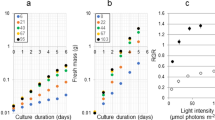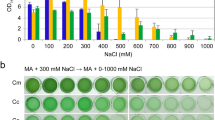Abstract
THE use of phosphate buffer mixtures when culturing Algæ has been shown to have several disadvantages. High phosphate concentrations are often injurious to Algæ, and in alkaline solutions precipitates of slightly soluble phosphates are formed, thus withdrawing from the Algæ elements necessary for growth. Nor has it been possible to make growth determinations at pH. higher than 8.2 on account of absorption of carbon dioxide from the air, which rapidly decreases the pH. In the experiments described here it has been possible partly to avoid these difficulties by using carbonate-bicarbonate buffer mixtures.
This is a preview of subscription content, access via your institution
Access options
Subscribe to this journal
Receive 51 print issues and online access
$199.00 per year
only $3.90 per issue
Buy this article
- Purchase on Springer Link
- Instant access to full article PDF
Prices may be subject to local taxes which are calculated during checkout
Similar content being viewed by others
Author information
Authors and Affiliations
Rights and permissions
About this article
Cite this article
ÖSTERLIND, S. Growth of a Planktonic Green Alga at Various Carbonic Acid and Hydrogen-Ion Concentrations. Nature 159, 199–200 (1947). https://doi.org/10.1038/159199b0
Published:
Issue Date:
DOI: https://doi.org/10.1038/159199b0
This article is cited by
-
Relations between algal populations and the pH of their media
Oecologia (1974)
-
Schwellenkonzentrationen verschiedener Stickstoffquellen f�r die Vermehrung einiger Bakterien aus n�hrstoffarmen Gew�ssern
Archiv f�r Mikrobiologie (1958)
-
Influence of Low Bicarbonate Concentrations on the Growth of a Green Alga
Nature (1948)
Comments
By submitting a comment you agree to abide by our Terms and Community Guidelines. If you find something abusive or that does not comply with our terms or guidelines please flag it as inappropriate.



